My body weight had never really been an issue in my life until I almost died from inflammatory bowel disease.
At my lowest, I was severely malnourished and my body was rejecting itself. I didn’t feel attractive being this weight; I felt weak and vulnerable and afraid. Right now I’m underweight again because I’m in a severe flare. I don’t “feel” skinny because I’m in constant discomfort and bloated 99 percent of the time. When I eat, my stomach swells and it feels like I’m carrying a bowling ball under my jumper. I am, but that’s not the point; we all have our quirks. I “feel” heavy but I know I am physically far from it.
For the entirety of my life I’ve been referred to as “skinny.” I’ve been a “skinny-mi-linky.” I’m “scrawny.” There’s “nothing to me.” I’ve been told I should be grateful for being “naturally skinny” and instantly disliked before I’ve even been granted the chance to disappoint them with my personality alone.
Now if all of this sounds akin to a millionaire complaining they’ve only managed to squeeze in five holidays this month, then let me reassure you I am actually pretty appreciative of my figure and am by no means looking for sympathy for it. I’m not particularly upset by having been called skinny, either; it’s never considered an insult in polite society so it’s difficult to find fault in it or take offense to it. Or at least for such a suggestion to be socially acceptable.
As a general rule, and most prevalently in the media, slim is considered the default for attractive. This isn’t in any way accurate of course, for more reasons than I have the energy to list. But mainly because there’s no such thing as default for beauty. There is no one skin color, body shape, or sex that is attractive to everyone on earth – it’s such a ridiculous concept, and our physical variety is what makes us interesting and sets us apart from one another. Can you imagine if we all looked alike and found the same things beautiful? We’d never get any work done from constantly locking lips with one another; the population would skyrocket; it would be an absolute catastrophe. So thankfully we don’t have to worry about that because what I find swoon-worthy you probably don’t and that’s great. My point is, my body is mine and my figure isn’t up for public debate.
In much the same way you would keel over if I were to call another woman a “fatty,” I don’t particularly appreciate people calling me a “skinny minnie,” for example. I’m not some sort of statue to be regarded and commented upon. Although birds do often defecate on my head, so there are similarities I grant you. I’m not saying “fat-shaming” is the same as “slim-shaming,” although it can certainly have a similar impact. I didn’t feel good during high school when I was called skinny. I felt singled out and exposed. It didn’t make me feel attractive, it made me feel bare. I was told I must have an eating disorder, or I wasn’t eating enough, or I wasn’t a proper “girl” because I was thin. As you can imagine, none of that serves to help a blossoming woman swell with confidence in her own appearance.
Skinny wasn’t good because skinny equals unhealthy for me. I am currently unable to put on weight because I have a chronic and debilitating illness centered around my bowel and stomach. When I lose weight I don’t celebrate, I silently commiserate and anxiously worry about what it means for the weeks and months ahead.
Bodies are individual and ours. No one should be permitted to call me “skinny” because my body is mine and only I should decide what I allow. I’m not saying we should all be over-sensitive about being called slim – again, on the whole it’s used in a complementary way, but we should have the confidence and self-assurance to speak up when any comment on our bodies makes us feel uncomfortable.
I no longer smile politely when someone makes a comment on my body because I and only I have complete ownership of it. If something is said about me that makes me feel unpleasant, then I will speak up about it. I’ve spent far too many years allowing conversation about my own carcass to go unchecked, and it chips away. At this stage in my life, the most important thing about my body is that it is healthy. Mine isn’t right now, so it’s even more vital to me to protect it. So set a precedent for what you will allow, and please be mindful of what words you use when talking about someone else’s body. You can only see the outer casing. There might be something wholly different going on underneath.
We want to hear your story. Become a Mighty contributor here.

